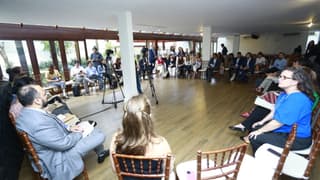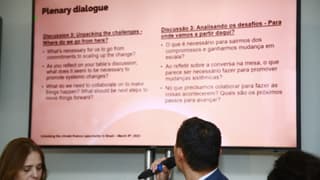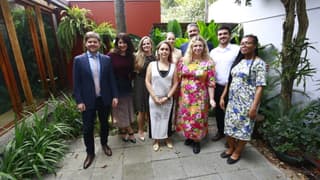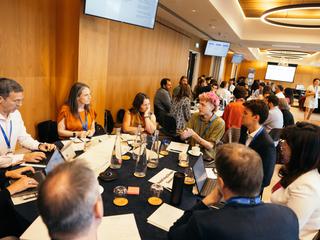How can we build a world-leading financial sector in Brazil and unlock capital flows to meet climate goals?
At Arc’s March 2023 workshop in partnership with the Institute for Climate and Society (iCS), financial decision-makers, think tanks, data organizations and NGOs, we discussed the challenges and opportunities the country’s finance sector is facing in the global race to net zero.
Here are seven ways our workshop participants concluded that we can accelerate positive progress…
1. Disclosing data and increasing transparency
Many companies in Brazil aren’t disclosing their climate-related activities, or, when they do, the data and methodologies are often insufficient or inconsistent. This makes it impossible to accurately evaluate the risks associated with climate change.
Standardized, comparable climate data, which takes into account local nuances, potential impacts on Brazil’s vulnerable populations and biomes, and adaptation needs, would allow financial institutions to make informed decisions and mitigate risk with clarity and confidence.
2. Designing a green taxonomy
We have just seven years to halve global greenhouse gas (GHG) emissions. A green taxonomy could help Brazil’s financial sector create the much-needed standardized framework for identifying and classifying economic activities at pace, in terms of both benefits and risks.
This, in turn, would help financial institutions to align decision making with climate goals, mitigate greenwashing, facilitate the development of green financial products, and enhance transparency and accountability.
While there is a need to mobilize more capital towards climate projects, there is also a challenge in having well-prepared and scalable projects in place ready to receive the investment. Public policy changes will help, along with alignment and engagement with international investors.

3. Setting clear and ambitious regulation
Consistent standards will be a significant step in the right direction, but robust regulation is also needed to establish processes to reduce greenhouse gas emissions and track how businesses are adapting to (and mitigating) climate change. This will ensure that companies are held accountable for their environmental impact and encourage them to take steps to reduce their carbon footprint.
There is also a need for clear and consistent regulation and policies for the real economy in Brazil. This should include fiscal policy, regulation of carbon credits markets, as well as favorable policies for the development of new technologies to encourage accelerated decarbonization pathways. Greater regulation in this area will allow financial institutions to exert pressure on companies that have supply chains susceptible to climate change and insist on more action.
Climate litigation is evolving too, with NGOs increasingly holding financial organizations to account. For example, Brazilian NGO Conectas Direitos Humanos wants BNDES (the Brazilian Development Bank) to develop a greenhouse gas emissions reduction plan to guide its investments. This is the first lawsuit against a development bank anywhere in the world and could have significant repercussions on wider climate finance.
Climate Finance in Brazil
One of the research reports we commissioned on the challenges and opportunities of climate finance in Brazil.
Read the Executive Summary
One of the research reports we commissioned on unlocking the climate finance opportunity in Brazil.

Next steps for Climate Arc
To help accelerate progress, we are working alongside our partners to develop a climate finance intelligence hub in Brazil, supported by a multi-stakeholder advisory council, that will address these challenges.
1. Building the next generation of climate finance professionals
Through a regular intake of local research analysts, the Hub will upskill early career professionals in corporate climate transition and ESG analysis, including relevant data, sectoral and local climate transition pathways. The Hub outputs will be twofold: firstly, cohorts of skilled professionals that can be hired in local markets, and secondly, openly accessible climate analysis on Brazilian companies which can be compared against global peers.
We have also received insight that these upskilling programs could be helpful to local financial institutions in the form of secondments. Arc will be exploring these opportunities with interested institutions.
2. Elevating the whole climate finance ecosystem through the provision of open data
Through partnerships with iCS and other NGO partners working on regulations, taxonomies, campaigns, public finance and blended finance opportunities, Arc will provide the Hub analysis to facilitate their goals, wherever possible.
Arc’s global data and research work will be built based on the needs identified by local institutions and will be collected with the help of key local institutions. To this end, Arc will set up a small team in Brazil to help shape research development and collaborative models.

4. Improving financial equity in agri-business
Historically, sugarcane, cattle, and coffee have been Brazil's most profitable agricultural commodities. In contrast, smaller, more diversified agricultural businesses, such as cocoa, face limited access to credit.
Financial mechanisms are needed to support the entire range of agri-businesses – large and small-scale. Institutions should support a just and equitable transition that is financially profitable. With the right support, overlooked agricultural commodities can help generate income and revenue for local communities.
5. Designing insurance products with accuracy
Insurance companies require better techniques to evaluate climate-change, environmental and social risks and price their policies accordingly.
Insurance firms can play a vital role in promoting climate resilience by offering incentives for policyholders to adopt sustainable practices and invest in climate adaptation measures.

6. Backing early-stage innovation
Innovative products will be vital to address the climate change challenges faced by the country. In Mexico, for example, insurance products have been launched to protect coral reefs, which are proven to mitigate the impact of floods and storms to nearby coastal hotels and resorts. Brazil needs to develop similar products, insuring and valuing its natural assets.
Banks can also build innovation into their policies and actions, through improvements in professional qualifications, climate risk management policies, governance and financial products.
7. Building human capacity in climate risk analysis and blended finance
To access catalytic funding, more institutions in Brazil must develop strategies to build capacity. Executive leadership teams and boards often lack the analytical skills to assess the risks and opportunities associated with climate change, emphasizing the need to build capacity at all levels, not just among practitioners.
This is particularly the case for creating blended finance products for newer or riskier sectors. Blended finance has the potential to reduce transaction costs and attract private financing by improving risk-return ratios. In turn, it will unlock a better understanding on how this changes the risk-return equation for investors so that money can flow to the new chains.
Keen to hear more?
If you would be interested in being involved in the development of the Brazil Hub, please get in touch.



